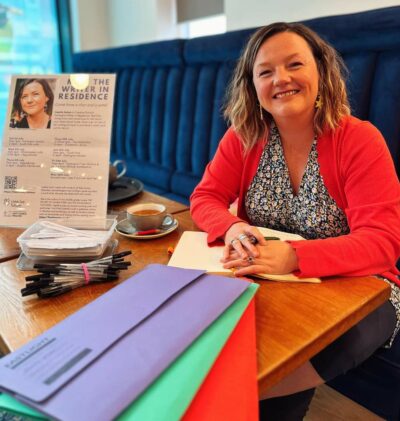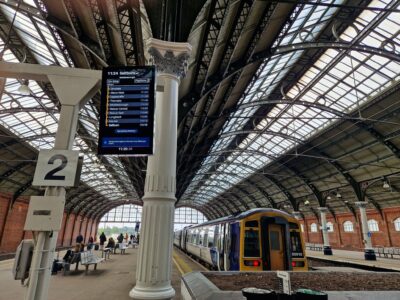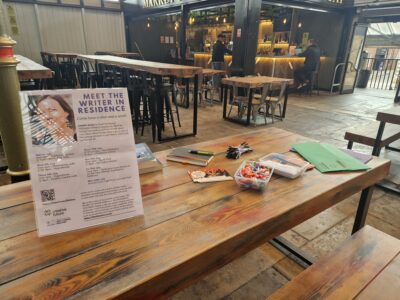Lisette Auton was our 2023 Darlington Writer In Residence–bringing the residency to the writer, and letting them make it best fit the place and their ideas. Her residency included writing a new piece for the CF Writers’ Award anthology, six writing workshops, and roving about town to cafes, bookstores, markets, parks, the train station and up and down the Bishop/Saltburn rail line.
I decided that I wanted the residency to take place in my hometown of Darlington, a place I have lived in for most of my life, but that I feel disconnected from. I live in the Denes, an area of terraced housing next to small parks divided by streets with a stream running through, made by the Quakers so that their workers had access to green space.
Darlington is a train town, a five pound note Rocket-shaped claim to fame. I have a studio on the ring road in the centre of town where car noises pass like waves. Most of my work as artist, writer, playwright, practitioner, does not take place in this town. Author does. Place is important. I wanted to unravel place and why my home does not often feel like home.
My parents came here when my dad was looking for work. Happenstance, chance. He was only based here for two years and yet we all stayed, we were settled. Others had the Darlo swagger, the families borne years back, the local knowledge and lilt that made Darlington sound like it belonged to them, and when my mouth tackled the vowels it outed me as outsider even though I was born here, in a hospital now razed to the ground and brought back to a street that was the last one on the edge of town.
Edge of town. I think, I have always stayed there. Looking in. I am observer, chronicler, safer at a distance not joining in.
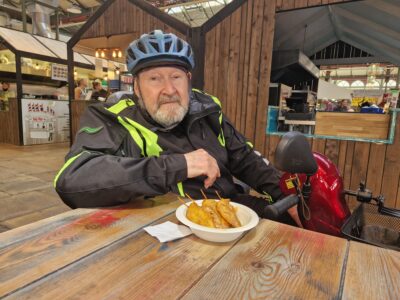
They both came to the workshops I held. Holding workshops aren’t just instructional, they are holding space. Holding space and inviting in – which is what happened at the Hippodrome café with the Cuckoo Club – a group of people living well with dementia. Their end of the café was far more exciting than mine, twenty plus people crammed around a long table, games of dominoes, raucous laughter. I asked what was going on and I was immediately invited to the table. At the end of the session I was invited back. I will be going.
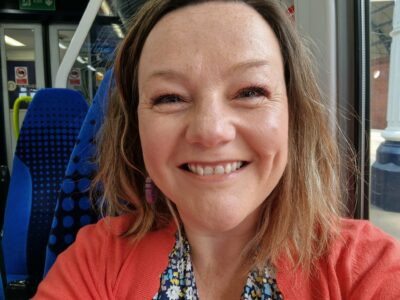
During my residency, I filled 76 pages of my notebook (very thin dotted lines, A5), delivered six workshops, and spoke with over 155 people. I talked and wrote with strangers, and now have sketches and poems, the beginning of a long-form creative non-fiction piece, a 7,877 word lyrical essay I need to edit down, and lots of thoughts to think further into existence.
I have discovered that others too want to feel connected to a creative heartbeat in this town and I have a desperate need to deliver that for them, but selfishly, now I know how that connection feels, for me. I feel the need to justify. I feel the need to explain in numbers why this time to think and write and connect was important. I wish I didn’t feel this need, but I do, and now, maybe, I can just write.
I’m going now, lovely to talk to you.
Do you live in Darlington?
Yes, nearly all my life.
Funny that I’ve never spoken to you before.
That made me think. What chance do we get to speak to strangers? How this made me meet people, and though exhausted, made something happen, entwine, make me feel rooted.
Connection here is woven through place. Each venue I wrote in, picked to reflect a flavour of the town, its people (and places that responded to emails with a yes), turned out to yield pages of memories from places there still now, and not. Recovering these made me realise that where I thought I was floating, I am in fact tethered.
I wrote and spoke with people from aged two to ninety, from those beginning their time here, to those coming to its end with grace, living well with dementia beside their loved ones over scones and cups of tea in the theatre’s café.
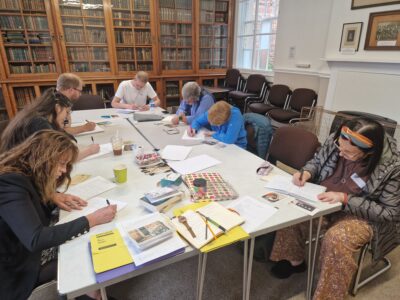
I will find a way to make these connections continue, the scuffing of pen on paper that linked us together, linked me to my town and its creative beating heart. Disconnect to connection. Memories unfurling.
I live here. I am proud to live here. To feel like a chronicler and cataloguer rather than a doer, but to have found a space and place of peace with that. To be welcomed into my own sessions, brought a cup of tea, shared jokes, and by the end, new friends who stayed to stack the chairs away, no more than five in a pile.
I thought a lot about value. The value that we place on where we live, some towns being deemed better or worse than others. The value with which we treat and greet people, say hello, offer a how are you, a welcome, a cup of tea. Say hello to strangers. The value in paying a writer to write in situ. Is there value in that? I’m not sure that it is up to me to decide. The feedback forms are in and glowing. I have new creative avenues to tread, words tumbling, connections made. I feel valued, valuable, able to give value here, now. Maybe I should have felt like that before, but this legitimised, gave me a (literal) cape to wear, gave me figures to justify.
This is how I will craft my piece:
Flash of person passing frosted windows
Callus on my finger
I am made of concrete and bone
In a sunbeam with a dictionary
cut off from the roll
I wish I could lose my jump reaction
[being found was found out]
I wish I could lose my connection
[how I fit in and how much is too much]
I wish I could lose my concentration
[I am made of concrete and bone]
Under the stairs; treasures and wotnots
its deep purple underbelly is revealed; a key
[it doesn’t have to open anything]
The value of home. I think I get it now. Concrete and bone.
How to be a writer in residence:
- Keep showing up. Keep smiling. Keep making space for hello.
- Worry.
- On the 5th workshop you will overhear the building instruction speech and know you know it all now and wish you could tell the nervous you of three weeks ago that you’d learn it and it would be OK.
- Make sure there are love hearts for Denise; she is picky, does not like the lollies. This has been mentioned and noted.
- Say yes to tea and coffee when it’s offered and remember to eat.
- Have no expectations. These are very different to low expectations. It means you can follow golden threads.
- Whatever happens, write it down. You will forget. The abject drivel you thought you were spooling has something shimmering at the heart. Time to mine it. You can only mine it, if it’s there. Basically, Lisette, please just write.
- Look for the serendipity and follow it.
- Don’t take your phone. Well, do. Because you need it for the code to get into the building, and to be able to leave your number so people can get inside, and work out which of the many Hannahs you were here to see when reception asks. But then. Do not get it out of your bag. It’s a time drain. The worthless words are not worthless. They feel it now. They have merit. Write.
- Your studio is lovely but it is isolating. Get out. Chat.
- Scribble for the sake of scribbling. Just for pen on paper.
- Connections are important. Nourish these burgeoning links.
- Have tissues on hand. Writers will spill coffee.
- Give writers a change of tack with glue sticks, safety scissors and a stash of magazines. Whistling, finger tapping and concentrating faces will ensue. Find ways to break out of the words on the page, but remember to put them on it too.
- You thought you were writing about home. It’s just the lens through which you visualise that word and space that was shuffled and fragmented.
- A young girl in the library visited all the places in my book, here is important. This town is important. All places are. But in spite, despite, this is mine.
A plea to other organisations offering writing residencies:
A writer in residence needs time to write. Paid time. With no output. A writer in residence is not a writer in residence if they are delivering workshops, planning and prepping the entire time. Then they are a practitioner. A facilitator. They are still a writer, but they do not have time to write if they are sharpening pencils and ensuring their participants are safely held and given space to write. Please stop calling being a workshop leader a writer in residence. This was a residency. A residency built together, investigating something I decided that was meaningful to me. The burden of bookings, admin, emails, was all taken from me. I held workshops. I was paid to plan and deliver these. I held drop-ins. I was paid to plan and deliver these. And I wrote. I was paid to do this. The obligation? This blog post and a piece for the anthology. The paid time given to write? Far exceeded these obligations.
Coming into this I was a writer who had fallen out of love with writing. Stupendously fortunate to have lots of paid writing commissions, but I’d forgotten what writing for me felt like. I didn’t know why I began. This residency, this time to write was awkward, thrust me into feeling and noticing, showed me the secret scribbler I once was and I fell back in love with her.
I have a writing practice once more, that is mine and I treasure. I have ideas exploding and in areas and genres that I do not currently write.
Not sure what a mojo actually is, but I’ve found it.
Give writers time to write, trust them, this is the most valuable thing you can give.
